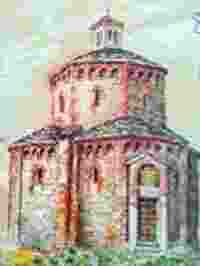Prophet

Nahum
Saint Nahum, the prophet, preached that God rules the course of time and judges the peoples in justice.
Roman Martyrology, 1 December, n. 1
Join us
Nahum Prophet
The Prophet Nahum lived towards the middle of the 7th century BC. was a native of Elcos, a village located by some in Galilee, which could be identified with Elqush near Mosul (not far from). Naum was a contemporary of King Josiah, ruler of Judah from 640 BC to 609 BC and his preaching had almost certainly place between 662 and 612 BC.
In his short book he sings the fall of Thebes by the Assyrians (663 BC) and the fall of "(612 BC), the thriving Assyrian city that overlooked the Tigris River and which, according to the Bible, was destroyed in 512 BC.
Here is the oracle about ", according to the vision of Nahum:" Woe to the bloody city, full of lies, full of robberies, which never ceases to plunder! Whistling of whips, crashing of wheels, trampling of horses, creaking of chariots, pressing horsemen, flashing of swords, sparkling of spears, wounded in quantity, piles of dead, endless corpses, stumbling over corpses.
For the many seductions of the prostitute, the beautiful witch, the teacher of charms, who traded peoples with her affairs and nations with her charms. Here I am to you, oracle of the Lord of hosts. I will lift your garments to the face and show your nakedness to the people, your shame to the kingdoms. I will throw garbage at you, I will shame you, I will expose you to ridicule. Then whoever sees you will flee from you and say: "Nineveh is destroyed!". Who will pity her? Where will I look for those who console you?".
(Na 3,1-7).
The prophet Nahum does not address the people directly: his prophetic work is aimed at Nineveh, the capital of the Assyrian empire; the prophet is pleased with the imminent dramatic catastrophe that will annihilate the enemy city, crushed under the weight of his perfidy and fornication which are the cause of so much ruin: And he expresses just as much joy for the moment in which Nineveh will fall, as tyranny will finally disappear of the Assyrian kingdom.
Nahum's message testifies that God is tireless in his judgment and knows how to punish his adversaries at the right moment: "The Lord is a jealous and avenging God; the Lord is avenger and full of fury; the Lord takes revenge on his adversaries and keeps rancor towards his enemies".
(Na 1,2).
Even the most powerful empires will be annihilated by God, even the pride of Nineveh will be annihilated by those who do not forget the robberies and cruelty of his selfish dominating power: "Now I will break his yoke off you and break your chains" (Na 1:13), "Woe to the bloody city, full of lies and violence, which never ceases to plunder!" (Na 3,1),
"You have multiplied your merchants more than the stars in the sky; they are like (Na 3,16). Israel will instead be free from Assyrian dominion: "Now I will break his yoke off you and break your chains" (Na 1,13). Israel will have to be restored in his glory: "The Lord restores the glory of Jacob, and the glory of Israel".
(Na 2,2).
